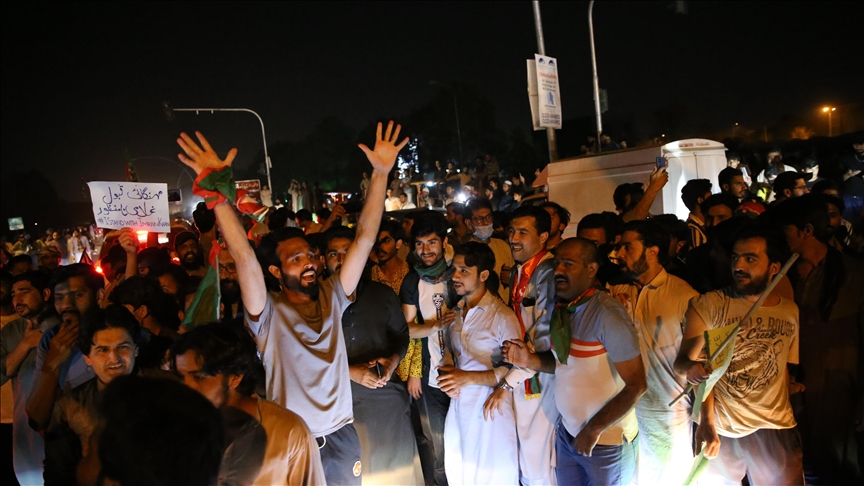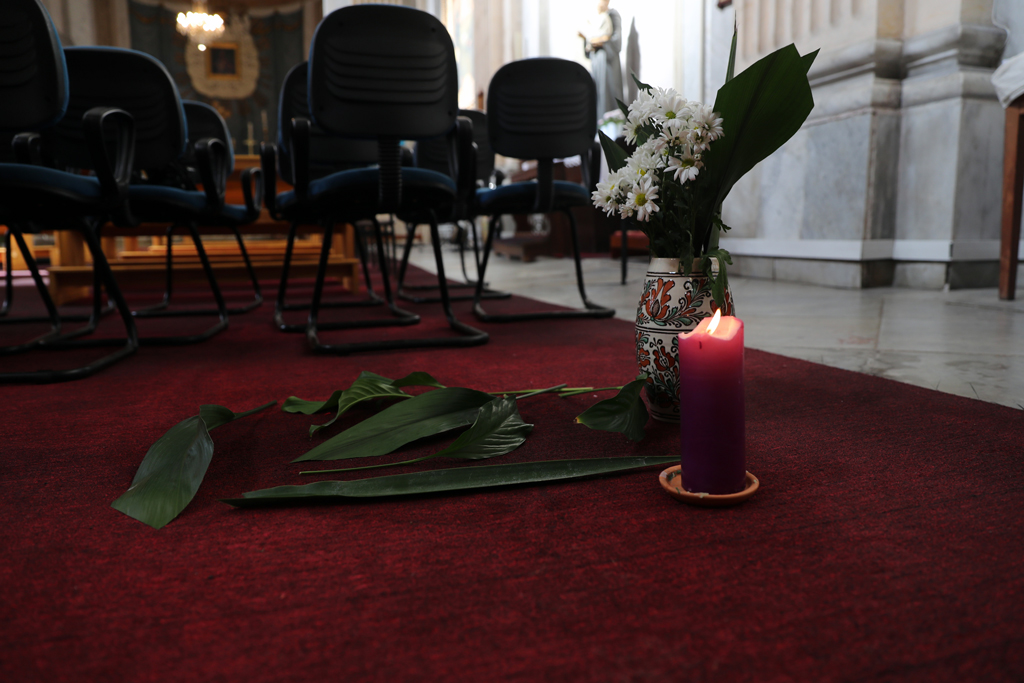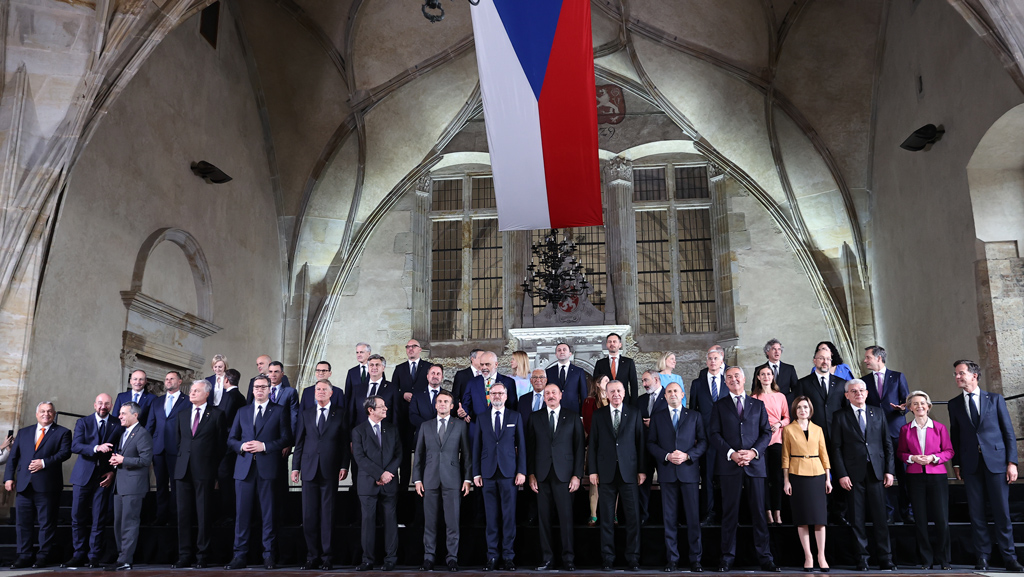Pakistan has recently been experiencing turmoil, which resulted on Sunday, April 10, with the removal of Prime Minister Imran Khan from office, making him the first Pakistani prime minister removed through a no-confidence motion. The political situation in Pakistan started to deteriorate last week following the ruling of the deputy speaker of the National Assembly against the no-confidence motion against Prime Minister Imran Khan and the dissolving of the National Assembly as requested by the latter.
The political situation in Pakistan is still not stable, and a new government is expected to be formed soon. However, at this point, it is important to understand the reasons that led to this turmoil and what the removal of Khan from office means for Pakistan. Within this framework, several experts from Turkey and Pakistan have briefly analyzed the events and their implications, not only for Pakistan but for the region and the world as well.
Prepared by
Gloria Shkurti Özdemir
Experts
Amina Khan
Waqas Sajjad
Gürol Baba
Hajira Maryam
Riyaz ul Khaliq
Nazmul Islam
Waqar Badshah
 |
Amina Khan
Centre for Afghanistan, Middle East & Africa (CAMEA),
Institute of Strategic Studies (ISSI) |
 |
Waqas Sajjad
University of Management and Technology |
With political instability brewing, rising inflation and protests, and an economy in shambles, the Imran Khan-led PTI government faced tremendous opposition for several months and several quarters before he became the first prime minister to be ousted through a vote of no confidence in Parliament just before midnight on April 9, 2022.
The political upheaval in the previous months had been compounded by several factors, including Khan’s uneasy relationship with the military establishment, and his bouts with opposition leaders, whose support he needed in Parliament. Once the opposition filed a motion of no confidence on March 8, 2022, accusations and conspiracies once more began, with the government desperate to hold on despite several party members leaving its ranks and allying with the opposition. The vote of no confidence was to be held on April 3 but was blocked by Prime Minister Khan's dissolution of Parliament, which sent shock waves across the country as it was regarded as an illegal and unconstitutional move. For some days prior to this unprecedented act, Khan and his party leaders had been accusing the opposition of being complicit in a foreign conspiracy to remove his government. Khan had implied that the foreign country in question was the United States, leading to much consternation in foreign policy circles about the effects on Pakistan-U.S. ties. Subsequently, with the president of Pakistan's decision to dissolve the National Assembly of Pakistan and order fresh elections, on the advice of the prime minister on April 3, the country seemed destined for one of its worst political and constitutional crises. Given that the blocking of the no-confidence vote was deemed illegal by the opposition – and by legal experts – the matter then went to the Supreme Court of Pakistan, which declared on April 7 that this move had been unconstitutional. With Parliament restored, opposition parties lauded the decision of the Supreme Court and prepared for the vote to be held on Saturday, April 9, with some analysts in the country suggesting that Khan, who did not seem to have the majority required in Parliament to survive the vote, could resign from his position together with his Cabinet before the vote takes place.
Saturday, April 9 eventually brought the weeks of political intrigue to a dramatic end – and likely started a period of new political concerns. After delaying the vote for the entire day, the speaker and deputy speaker of the Assembly resigned from their positions mere minutes before the end of the day at midnight. The vote was finally held after hours of conspiracy theories and rumors, leading to Khan's ouster, and celebrations among his political opponents who saw this as the end of the darkest period in Pakistan's political history.
Despite Khan's poor performance, the PTI has gained the support of the masses by standing up to alleged foreign interference; however, at the same time, it remains to be seen how and if the PTI will be able to rebuild itself and build relationships with opposition leaders, whom it has alienated to a great and possible unredeemable extent, as well as with the military leadership. And the new government will have little time to settle in, as it will be expected to produce immediate results.
Given the ongoing political instability, Pakistan is likely to go through a rough period, especially with its economy facing immediate effects, including the dollar rate rising to unprecedented levels. This points to short and long-term consequences, with the new incoming government unable, and perhaps unwilling, to provide policies to reverse the negative trends.
Pakistan's key relationships – China, India, and the US included – are likely following the events in Pakistan with keen interest. It is improbable that any significant change will take place in the region as a result of the political crisis in the country. But the leaders and prospective leaders of the country owe it to 220 million Pakistanis to prioritize the interests of the country over their personal and party interests. Given the political and economic instability and the nature of divisions due to political affiliations, Pakistan needs to go through a lengthy period of strengthening its democracy. The return of dynastic politics, much derided and much adored across the country, must play a part in this process and build unprecedented trust among its critics. Pakistan's future depends on this.
Back to top
The rivalry between the United States and the People’s Republic of China, which made its mark on the strategic, political, and economic texture of the Asia-Pacific region in recent years, together with the interaction among regional states that maintain close relations with both nations separately, came up during the dissolution of Pakistan’s National Assembly.
Amid the turmoil, which followed the National Assembly’s dissolution at Prime Minister Imran Khan’s request, some claimed that the turmoil was rooted in Pakistan’s development of closer relations with China in recent years. It is a well-known fact that the Russian Federation works closely with China on many of the Asia-Pacific’s regional institutions, including the Shanghai Cooperation Organization. India, in contrast, is among the closest partners of the United States in the region. Imran Khan’s refusal to sanction Russia during the occupation of Ukraine, his decision to criticize Indian Prime Minister Narendra Modi over his attitude toward India’s Muslim community, Pakistan’s recent purchase of advanced military equipment from China, including submarines and warships, and the display of Chinese-made military equipment during the National Day parade in late March represented significant moves that signaled where Imran Khan’s government stood regarding the U.S.-China rivalry.
In short, all those developments turned Imran Khan into a member of the anti-American club in the Asia-Pacific region and, in his own words, transformed his government into a target of the United States. As a matter of fact, Khan says that U.S. officials gave a letter to Pakistan’s ambassador to Washington on March 7 regarding Khan’s resignation. Such statements, which the West dismissed as conspiracy theories, provide insight into how Imran Khan’s supporters perceive the backdrop of the National Assembly’s dissolution. Another part of that perception relates to the opposition, which claims to be working with “the Western powers” and whom some senior members of Khan’s party have accused of “treason.” To demonstrate that the people, too, share that perception, Imran Khan called for the National Assembly’s dissolution and elections.
Amid the current crisis, the military must be treated as the defining factor in Pakistan’s domestic politics. Some commentators maintain that Khan’s relationship with the army, which formed the basis of his power in the background, deteriorated due to high inflation, unemployment, corruption investigations, and certain appointments to the Pakistani intelligence agency’s management – which, they say, led to the shift of his power base. As a matter of fact, Gen. Qamar Javed Bajwa, the Chief of the Army Staff, stated, the day before Parliament’s dissolution, that Pakistan and the United States had a long and seamless relationship – which was noteworthy because it signaled the top military command’s stance toward foreign policy. As such, the military’s attitude will be an important factor during the election campaign, potentially deciding whether or not any future government will be formed under Khan’s leadership.
Another key factor is the political discourse. Provided that many people in Pakistan endorse Khan’s anti-American and anti-imperialist approach, it is necessary to keep in mind that certain social groups could agree that the government was toppled by the United States due to its foreign policy.
All in all, the current state of affairs suggests that Pakistan’s foreign policy – not just its democracy – has entered a phase of turbulence, and the country will move closer to one of the new global groups: the United States and the West, or China and Russia.
Back to top
 Hajira Maryam
Hajira Maryam
Journalist and South Asia Researcher
Throughout Pakistan’s history, no prime minister has completed their full term. And Imran Khan met the fate of his predecessors on April 10, when he was ousted through a much-delayed no-confidence vote. This is the first time a no-confidence vote against a prime minister of Pakistan has been successful.
When in 2018 Khan won the elections – whose success the opposition alleges happened through military support – he promised to make the economic machine work for the poor. However, during his rule, his party fell short of fulfilling its ideals, granting an opportunity for the opposition to oust him through a motion of no confidence.
Khan was ousted after a series of chaotic political dramas ongoing for weeks in the country. Last Sunday, on April 3, Imran Khan asked the president to dissolve the National Assembly when a no-confidence vote was scheduled to be held against him. As the National Assembly dissolved, it was seen as an unconstitutional move and on Thursday, April 7, the Supreme Court ruled that what Khan did was illegal and unconstitutional. As a result, a new vote was scheduled, which took place on Saturday.
Khan did not step down easily. Throughout these events, Khan and his ruling party members have been stressing that a U.S.-led foreign conspiracy is being used to destabilize Pakistan and unseat Khan.
The National Assembly session on Saturday commenced at 10:30 a.m., and it dragged on for more than 12 hours, with the actual vote finally taking place around midnight. The no-confidence motion required 172 votes in the 342-seat Parliament to pass, and by the end, it got the support of 174 parliamentarians.
Now a coalition government is set to be formed. Indeed, it is important to state that in a way this will be an awkward coalition because the opposition has been focused on the removal of Khan.
There are problems that Pakistani people have been mired with, especially the double-digit inflation going on for months, worsening due to the ongoing political fiasco. For this reason, for me, it's more like a power tussle. I don't really think that anybody – be they the opposition or Khan – is generally interested in what the people want or what is going to benefit the citizens of Pakistan at this point.
Also, Pakistan throughout its history has had successive military regimes. No prime minister has ever completed their full term in office. And at this point, we are looking at a kind of juncture in foreign policy. Khan is someone who wants to align more with Russia and China; whereas the establishment has been very vocal with its statements about the U.S., which it considers one of the most important strategic partners when it comes to foreign policy. All this reflects that the army and Imran Khan are not on the same page.
I doubt there's going to be any sort of political stability in Pakistan after all of this – not for now at least.
Back to top
 Riyaz ul Khaliq
Riyaz ul Khaliq
Center for Islam and Global Affairs, Istanbul Sabahattin Zaim University
The political upheaval triggered by a vote of no confidence in Pakistan is yet another normal event of troubled politics in the 75-year history of the world’s fifth-most populous country. However, this time, Imran Khan, a charismatic leader who takes no qualms about calling spade a spade, sees it as a foreign plot to remove him from the office.
The top Pakistani diplomat in Washington, Khan said, was warned by the Biden administration that U.S.-Pakistan relations could return to the good old days only when the 69-year-old cricketer-turned-politician is removed from the office. The U.S. has denied the allegation.
This claim of the U.S. political maneuvering in Pakistan is not new. Many in the past have sought help from Washington for their political rise in Pakistan. But the Pakistani political sphere has been mostly dominated by its strong, at around 600,000 members, military. And Khan, who moved up the political ladder under its patronage, has not remained silent in criticizing the past decisions taken in the sprawling yet powerful General Headquarters (GHQ), located in the historic Rawalpindi city of Pakistan.
The Parvez Musharraf era has been his prime target for allowing the U.S. to use Pakistani space for drone attacks inside the country as well as in Afghanistan. Pakistan lost close to 80,000 of its people and over $150 billion in trade estimates after the U.S. launched the so-called war on terror by invading Afghanistan in 2001.
Khan’s refusal statement of “Absolutely Not” to the U.S. when it sought a military foothold in Pakistan is seen as one of the major issues that ruffled feathers in Washington.
He has remained adamant about navigating an independent foreign policy for a country that is dependent on foreign investments and is undergoing a $6 billion IMF program. Pakistan is yet to come out of the FATF gray listing, and Khan’s government has accused the anti-money laundering body of politicizing the issue against Islamabad despite obliging almost all the requirements to come out of the listing.
While the politically diverging opposition parties, some of whose leaders are facing massive corruption charges, converged against the Pakistan Tehreek-e-Insaf government in recent months, Khan dropped the bombshell of the U.S. regime-change move only after he addressed the 48th Foreign Ministers’ Summit in Islamabad in March, coinciding with Pakistan’s 82nd Resolution Day.
After gathering public momentum on the issue, Khan-led Pakistan’s top National Security Committee decided to issue a protest demarche to Washington against the alleged interference in Pakistani internal affairs.
Khan moved faster and dissolved Parliament but the judiciary restored it and asked Khan to face the vote of no confidence. Interestingly, the court has yet to comment on the U.S. regime-change interference – the pretext that Khan used to dissolve Parliament and call for fresh elections.
On the tumultuous night of April 10, the National Assembly of Pakistan’s speaker and his deputy, both from the Khan-led Pakistan Tehreek-e-Insaf (Movement for Justice) party, stepped down from their posts with the former claiming he cannot take forward the proceedings because “I’m convinced there is a foreign plot” in the no-confidence move. An opposition lawmaker took the stage, and Parliament voted to oust Khan, now a former chief executive of the only nuclear-armed Muslim country. No premier has completed his five-year term in Pakistan. Of all, Khan is the first to have lost the majority in Parliament and move to the opposition benches.
This political upheaval has once again brought to the fore the “real” power centers in Pakistan.
There is no doubt the powerful military fell out of favor with Khan. His stature was only growing for his anti-U.S. rhetoric, battle against Islamophobia, and focus on reaching out to the common masses through his welfare programs.
Popular for his extempore conversations, Khan refused to budge before international media or watchdogs for his silence on the situation of Uyghurs in China, the iron brother of Pakistan. Instead, he called out the silence of Western capitals on the annexation of Kashmir by India on August 5, 2019, when Khan was ruling Pakistan.
At a time when all Western forces are out against Beijing, Khan became the biggest promoter of China’s governance policies for pulling 800 million people out of poverty and its unprecedented economic growth. Pakistan’s warming up to Russia, a Cold War-era opponent of Islamabad, is now seen as the biggest scar in U.S.-Pakistan relations. Khan refused to abandon the trip even when the U.S. national security advisor asked his Pakistani counterpart to stop the prime minister from visiting Moscow. These events unfolded after the U.S. faced a humiliating defeat in Afghanistan in 2021 and Khan put his government’s weight behind the Taliban-led interim government.
With a “favorable” regime returning to power in Kabul, Pakistan saw an opportunity in regional connectivity, linking Central Asia with South Asia via Afghanistan and that is where Pakistan made a shift to geo-economics, which the Afghanistan interim government has also eulogized to reap economic benefits.
Now, China has also given its nod to extend the multibillion-dollar China-Pakistan Economic Corridor, or the CPEC, to Afghanistan. Pakistan has not avoided Western investments in the CPEC. Rather it has urged the U.S. to make counter investments in Pakistan if Washington feels Islamabad is drifting toward Beijing.
However, under these circumstances, rebooting relations with the U.S., Pakistan’s estranged relations with India play a major role. India, a major anti-China ally of the U.S. as part of Quad, enjoys dominance in power corridors in Washington. So much so that Pakistan faced a media campaign from India when it named a former president of Azad Jammu and Kashmir as its new ambassador to the U.S. But what we are witnessing now in Pakistan is both political and geopolitical remarking.
In its bid to win reconciliation with Washington, Pakistan also appears to have returned to a so-called Four Point Formula on Kashmir to resume dialogue with India. Pakistan’s historic stand has been the U.N.-sanctioned right to self-determination for Kashmiris. This formula offers joint control of the disputed region. Kashmiris have in the past resisted the idea, first mooted by Pakistan military dictator Musharraf.
So, any new “minus-Khan” government, allows Pakistan realignment, both in the region and beyond.
Back to top
 Nazmul Islam
Nazmul Islam
Ankara Yıldırım Beyazıt University
A single phrase – “Pakistan at a crossroads” – has been used to describe the various challenges that Pakistan has encountered since becoming independent. The current political turmoil, in turn, shows that Pakistan has neither learned the lessons of its mistakes nor is ready to move forward. It is important to stress that Imran Khan was elected in 2018 as a popular reformist that promised welfare to the poor, pledged to stop the corruption, and end the boom and bust cycles that troubled Pakistan’s economy for decades. However, the country has experienced one of the worst inflations crises in Asia, as the inflation rate for basic needs, such as food and petroleum, climbed to 15.1% year-on-year. Khan’s political future was already at risk due to that disappointment. Among other things, Khan’s engagement with China and Russia displeased the West – which, according to some commentators, marked the beginning of the end. Indeed, critics say that the West and its allies played a major role in deepening the crisis. Furthermore, Imran Khan accused Donald Lu, the U.S. assistant secretary of state for South and Central Asian affairs, of orchestrating the plot to topple his government. What is happening is generally unsurprising for anyone that is familiar with Pakistan’s past. Imran Khan failed to meet expectations, but that is but a symptom – not the source of the problem! Still, one of three things will happen in Pakistan under the circumstances: 1. Supporters of Imran Khan’s party, the PTI, have been protesting. It seems that they will continue protesting and the country will prepare for the next election under those circumstances. As a matter of fact, the PTI’s parliamentarians have left the National Assembly altogether. It is important to know, however, that Imran Khan lost due to the coalition parties – not the parliamentarians or supporters of his own movement. Political parties tend to change their positions to maximize their interests. According to political scientists, the political parties in some countries tend to come to power with greater support under such conditions. That could happen in Pakistan, too, if the former opposition parties fail to pursue a successful policy for the country’s future – and, among other things, to promote economic development. 2. Formed by a multitude of opposition parties, the coalition will not last long. Since contemporary world politics is about power politics, Pakistan’s current opposition parties will soon face the same problem that Imran Khan faces right now. 3. If the coalition parties cannot govern successfully until August 13, 2023, Pakistan could hold an early election or come under a military-controlled administration.
Beyond all those factors, the military, the judiciary, nongovernmental organizations, and press unions remain quite strong in Pakistan. Over the last 75 years, those stakeholders have taken very significant actions and played a major role historically. According to certain critics, those entities could play the same role for the next prime minister, sooner or later, that they played for Imran Khan.
From the Turkish perspective, in turn, Turkey maintains very good relations with all political parties in Pakistan. On the path to globalization, however, Imran Khan has been a good partner for Turkey. Notwithstanding, one could argue that the incoming Pakistani leaders, who will play a role in bilateral relations, will have good relations with Turkey as well. The problem is that hardly any leader, except Imran Khan, has been willing to lead the charge or even talk about humanitarian crises or the Muslim community’s problems.
Let me add that many countries in South Asia, which treated China as a model and received Chinese investments, experienced similar problems as Pakistan. For example, the same situation occurred in Sri Lanka and Myanmar. Indeed, the protest in Sri Lanka was so powerful that the government banned the use of social media. Something similar had occurred in Nepal some three years ago, but the situation returned to normal when India exerted its influence through political parties. Some critics believe that the same thing could happen in Bangladesh, too, but that country’s good relations with India as well as the United States could ensure that Bangladesh survives the looming crisis with relative ease – just like Nepal.
All the developments that we are currently witnessing in South Asia are part and parcel of America’s policy regarding South Asia and the Indo-Pacific region – reflections of Washington’s mission to end China’s regional influence. It would make sense to interpret future developments with an eye on America’s regional strategy and the Chinese presence in the region.
Back to top
 Waqar Badshah
Waqar Badshah
Ibn Haldun University
Pakistan is currently going through a very difficult period in its history. As we all know, the deputy speaker of the National Assembly ruled against the no-confidence motion under Article 5 of the Constitution. Following that, Prime Minister Imran Khan advised the president to dissolve all assemblies and announced that the country would hold early elections. On the other hand, both the opposition and the government accuse one another of treason. The government claims that the opposition committed treason by collaborating with foreign powers to topple the government. Meanwhile, the opposition has slammed Imran Khan for acting unconstitutionally.
Umar Ata Bandial, chief justice of the Supreme Court (SC), later took legal notice of the current crisis. The Supreme Court, on the other hand, would only rule on the legality of NA Deputy Speaker Qasim Suri's ruling on the no-confidence motion. The Supreme Court ruled on April 7 that the deputy speaker's actions were illegal and that there would be a vote of no confidence against Imran Khan.
Pakistan is the only country that has suffered the greatest loss because of its participation in the Afghan war with the United States. Some 70,000 precious human lives were lost, much more than any NATO or ally nation. The estimated economic loss was around $220 billion, and the social impact was severe. Additionally, the menace of terrorism, extremism, intolerance, drugs, and gun culture were extra gifts. Yet Pakistan was penalized and imposed the hardest sanctions. The U.S. has been pressurizing from all directions, sometimes through the IMF and the FATF, sometimes through its ally countries, and sometimes directly threatening dire consequences.
The U.S.’ struggle to overthrow Prime Minister Khan represents its most powerful pushback against the emerging multipolar world order since its humiliating withdrawal from Afghanistan last August. The success of this operation could immediately destabilize the entire subcontinent, especially if the worst-case scenario comes to pass of a newly U.S.-controlled Pakistan deliberately worsening relations with multipolar heavyweights such as China and Russia – which are not, coincidentally, the core of this evolving world order.
Pakistan, in my opinion, is attempting to be a partner in peace with any country based on equality rather than a partner in war. Pakistan should follow in the footsteps of Turkey’s President Recep Tayyip Erdoğan and develop its own independent foreign policy.
Back to top


 Nazmul Islam
Ankara Yıldırım Beyazıt University
A single phrase – “Pakistan at a crossroads” – has been used to describe the various challenges that Pakistan has encountered since becoming independent. The current political turmoil, in turn, shows that Pakistan has neither learned the lessons of its mistakes nor is ready to move forward. It is important to stress that Imran Khan was elected in 2018 as a popular reformist that promised welfare to the poor, pledged to stop the corruption, and end the boom and bust cycles that troubled Pakistan’s economy for decades. However, the country has experienced one of the worst inflations crises in Asia, as the inflation rate for basic needs, such as food and petroleum, climbed to 15.1% year-on-year. Khan’s political future was already at risk due to that disappointment. Among other things, Khan’s engagement with China and Russia displeased the West – which, according to some commentators, marked the beginning of the end. Indeed, critics say that the West and its allies played a major role in deepening the crisis. Furthermore, Imran Khan accused Donald Lu, the U.S. assistant secretary of state for South and Central Asian affairs, of orchestrating the plot to topple his government. What is happening is generally unsurprising for anyone that is familiar with Pakistan’s past. Imran Khan failed to meet expectations, but that is but a symptom – not the source of the problem! Still, one of three things will happen in Pakistan under the circumstances: 1. Supporters of Imran Khan’s party, the PTI, have been protesting. It seems that they will continue protesting and the country will prepare for the next election under those circumstances. As a matter of fact, the PTI’s parliamentarians have left the National Assembly altogether. It is important to know, however, that Imran Khan lost due to the coalition parties – not the parliamentarians or supporters of his own movement. Political parties tend to change their positions to maximize their interests. According to political scientists, the political parties in some countries tend to come to power with greater support under such conditions. That could happen in Pakistan, too, if the former opposition parties fail to pursue a successful policy for the country’s future – and, among other things, to promote economic development. 2. Formed by a multitude of opposition parties, the coalition will not last long. Since contemporary world politics is about power politics, Pakistan’s current opposition parties will soon face the same problem that Imran Khan faces right now. 3. If the coalition parties cannot govern successfully until August 13, 2023, Pakistan could hold an early election or come under a military-controlled administration.
Beyond all those factors, the military, the judiciary, nongovernmental organizations, and press unions remain quite strong in Pakistan. Over the last 75 years, those stakeholders have taken very significant actions and played a major role historically. According to certain critics, those entities could play the same role for the next prime minister, sooner or later, that they played for Imran Khan.
From the Turkish perspective, in turn, Turkey maintains very good relations with all political parties in Pakistan. On the path to globalization, however, Imran Khan has been a good partner for Turkey. Notwithstanding, one could argue that the incoming Pakistani leaders, who will play a role in bilateral relations, will have good relations with Turkey as well. The problem is that hardly any leader, except Imran Khan, has been willing to lead the charge or even talk about humanitarian crises or the Muslim community’s problems.
Let me add that many countries in South Asia, which treated China as a model and received Chinese investments, experienced similar problems as Pakistan. For example, the same situation occurred in Sri Lanka and Myanmar. Indeed, the protest in Sri Lanka was so powerful that the government banned the use of social media. Something similar had occurred in Nepal some three years ago, but the situation returned to normal when India exerted its influence through political parties. Some critics believe that the same thing could happen in Bangladesh, too, but that country’s good relations with India as well as the United States could ensure that Bangladesh survives the looming crisis with relative ease – just like Nepal.
All the developments that we are currently witnessing in South Asia are part and parcel of America’s policy regarding South Asia and the Indo-Pacific region – reflections of Washington’s mission to end China’s regional influence. It would make sense to interpret future developments with an eye on America’s regional strategy and the Chinese presence in the region.
Back to top
Nazmul Islam
Ankara Yıldırım Beyazıt University
A single phrase – “Pakistan at a crossroads” – has been used to describe the various challenges that Pakistan has encountered since becoming independent. The current political turmoil, in turn, shows that Pakistan has neither learned the lessons of its mistakes nor is ready to move forward. It is important to stress that Imran Khan was elected in 2018 as a popular reformist that promised welfare to the poor, pledged to stop the corruption, and end the boom and bust cycles that troubled Pakistan’s economy for decades. However, the country has experienced one of the worst inflations crises in Asia, as the inflation rate for basic needs, such as food and petroleum, climbed to 15.1% year-on-year. Khan’s political future was already at risk due to that disappointment. Among other things, Khan’s engagement with China and Russia displeased the West – which, according to some commentators, marked the beginning of the end. Indeed, critics say that the West and its allies played a major role in deepening the crisis. Furthermore, Imran Khan accused Donald Lu, the U.S. assistant secretary of state for South and Central Asian affairs, of orchestrating the plot to topple his government. What is happening is generally unsurprising for anyone that is familiar with Pakistan’s past. Imran Khan failed to meet expectations, but that is but a symptom – not the source of the problem! Still, one of three things will happen in Pakistan under the circumstances: 1. Supporters of Imran Khan’s party, the PTI, have been protesting. It seems that they will continue protesting and the country will prepare for the next election under those circumstances. As a matter of fact, the PTI’s parliamentarians have left the National Assembly altogether. It is important to know, however, that Imran Khan lost due to the coalition parties – not the parliamentarians or supporters of his own movement. Political parties tend to change their positions to maximize their interests. According to political scientists, the political parties in some countries tend to come to power with greater support under such conditions. That could happen in Pakistan, too, if the former opposition parties fail to pursue a successful policy for the country’s future – and, among other things, to promote economic development. 2. Formed by a multitude of opposition parties, the coalition will not last long. Since contemporary world politics is about power politics, Pakistan’s current opposition parties will soon face the same problem that Imran Khan faces right now. 3. If the coalition parties cannot govern successfully until August 13, 2023, Pakistan could hold an early election or come under a military-controlled administration.
Beyond all those factors, the military, the judiciary, nongovernmental organizations, and press unions remain quite strong in Pakistan. Over the last 75 years, those stakeholders have taken very significant actions and played a major role historically. According to certain critics, those entities could play the same role for the next prime minister, sooner or later, that they played for Imran Khan.
From the Turkish perspective, in turn, Turkey maintains very good relations with all political parties in Pakistan. On the path to globalization, however, Imran Khan has been a good partner for Turkey. Notwithstanding, one could argue that the incoming Pakistani leaders, who will play a role in bilateral relations, will have good relations with Turkey as well. The problem is that hardly any leader, except Imran Khan, has been willing to lead the charge or even talk about humanitarian crises or the Muslim community’s problems.
Let me add that many countries in South Asia, which treated China as a model and received Chinese investments, experienced similar problems as Pakistan. For example, the same situation occurred in Sri Lanka and Myanmar. Indeed, the protest in Sri Lanka was so powerful that the government banned the use of social media. Something similar had occurred in Nepal some three years ago, but the situation returned to normal when India exerted its influence through political parties. Some critics believe that the same thing could happen in Bangladesh, too, but that country’s good relations with India as well as the United States could ensure that Bangladesh survives the looming crisis with relative ease – just like Nepal.
All the developments that we are currently witnessing in South Asia are part and parcel of America’s policy regarding South Asia and the Indo-Pacific region – reflections of Washington’s mission to end China’s regional influence. It would make sense to interpret future developments with an eye on America’s regional strategy and the Chinese presence in the region.
Back to top
 Waqar Badshah
Ibn Haldun University
Pakistan is currently going through a very difficult period in its history. As we all know, the deputy speaker of the National Assembly ruled against the no-confidence motion under Article 5 of the Constitution. Following that, Prime Minister Imran Khan advised the president to dissolve all assemblies and announced that the country would hold early elections. On the other hand, both the opposition and the government accuse one another of treason. The government claims that the opposition committed treason by collaborating with foreign powers to topple the government. Meanwhile, the opposition has slammed Imran Khan for acting unconstitutionally.
Umar Ata Bandial, chief justice of the Supreme Court (SC), later took legal notice of the current crisis. The Supreme Court, on the other hand, would only rule on the legality of NA Deputy Speaker Qasim Suri's ruling on the no-confidence motion. The Supreme Court ruled on April 7 that the deputy speaker's actions were illegal and that there would be a vote of no confidence against Imran Khan.
Pakistan is the only country that has suffered the greatest loss because of its participation in the Afghan war with the United States. Some 70,000 precious human lives were lost, much more than any NATO or ally nation. The estimated economic loss was around $220 billion, and the social impact was severe. Additionally, the menace of terrorism, extremism, intolerance, drugs, and gun culture were extra gifts. Yet Pakistan was penalized and imposed the hardest sanctions. The U.S. has been pressurizing from all directions, sometimes through the IMF and the FATF, sometimes through its ally countries, and sometimes directly threatening dire consequences.
The U.S.’ struggle to overthrow Prime Minister Khan represents its most powerful pushback against the emerging multipolar world order since its humiliating withdrawal from Afghanistan last August. The success of this operation could immediately destabilize the entire subcontinent, especially if the worst-case scenario comes to pass of a newly U.S.-controlled Pakistan deliberately worsening relations with multipolar heavyweights such as China and Russia – which are not, coincidentally, the core of this evolving world order.
Pakistan, in my opinion, is attempting to be a partner in peace with any country based on equality rather than a partner in war. Pakistan should follow in the footsteps of Turkey’s President Recep Tayyip Erdoğan and develop its own independent foreign policy.
Back to top
Waqar Badshah
Ibn Haldun University
Pakistan is currently going through a very difficult period in its history. As we all know, the deputy speaker of the National Assembly ruled against the no-confidence motion under Article 5 of the Constitution. Following that, Prime Minister Imran Khan advised the president to dissolve all assemblies and announced that the country would hold early elections. On the other hand, both the opposition and the government accuse one another of treason. The government claims that the opposition committed treason by collaborating with foreign powers to topple the government. Meanwhile, the opposition has slammed Imran Khan for acting unconstitutionally.
Umar Ata Bandial, chief justice of the Supreme Court (SC), later took legal notice of the current crisis. The Supreme Court, on the other hand, would only rule on the legality of NA Deputy Speaker Qasim Suri's ruling on the no-confidence motion. The Supreme Court ruled on April 7 that the deputy speaker's actions were illegal and that there would be a vote of no confidence against Imran Khan.
Pakistan is the only country that has suffered the greatest loss because of its participation in the Afghan war with the United States. Some 70,000 precious human lives were lost, much more than any NATO or ally nation. The estimated economic loss was around $220 billion, and the social impact was severe. Additionally, the menace of terrorism, extremism, intolerance, drugs, and gun culture were extra gifts. Yet Pakistan was penalized and imposed the hardest sanctions. The U.S. has been pressurizing from all directions, sometimes through the IMF and the FATF, sometimes through its ally countries, and sometimes directly threatening dire consequences.
The U.S.’ struggle to overthrow Prime Minister Khan represents its most powerful pushback against the emerging multipolar world order since its humiliating withdrawal from Afghanistan last August. The success of this operation could immediately destabilize the entire subcontinent, especially if the worst-case scenario comes to pass of a newly U.S.-controlled Pakistan deliberately worsening relations with multipolar heavyweights such as China and Russia – which are not, coincidentally, the core of this evolving world order.
Pakistan, in my opinion, is attempting to be a partner in peace with any country based on equality rather than a partner in war. Pakistan should follow in the footsteps of Turkey’s President Recep Tayyip Erdoğan and develop its own independent foreign policy.
Back to top



















